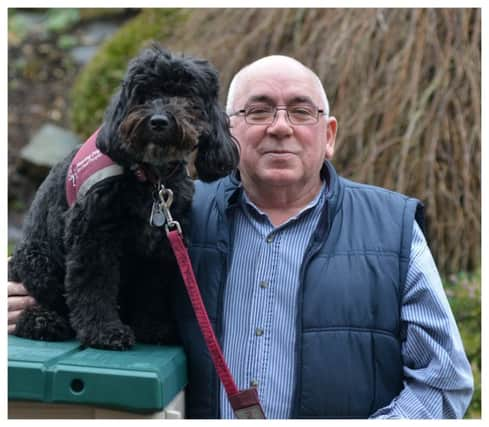More than just man's best friend


Spike, Ken’s beloved hearing dog, who’s been his ‘ears’ for the past nine years, is to undertake his last public engagement on Saturday before he hangs up his ‘uniform’ at the grand old age of 13.
Spike and Ken will have a stall at the Brig Farm shop in Bridge of Earn, helping to raise funds and awareness of the charity Hearing Dogs for Deaf People.
Advertisement
Hide AdAdvertisement
Hide AdThe pair have been inseparable since Spike came into Ken’s life aged four, and over the years they’ve raised many thousands of pounds for the charity, travelling all over the country to help spread the word.
Indeed, Spike has become something of a celebrity, scooping numerous awards for his work.
Now he’ll spend a well-earned retirement with Ken’s partner Sandra Donaldson at her home in Auchtermuchty, while Ken, who lives in Cupar, will have a new hearing dog to help him.
Spike, a cockapoo – a poodle/cocker spaniel cross – has an amazing range of signals to alert Ken to everyday sounds that most of us take for granted.
Advertisement
Hide AdAdvertisement
Hide AdHe starts his working day as Ken’s ‘alarm clock’ to wake him up, tells him when there’s someone at the door and when his phone’s ringing, as well as alerting him to the microwave finishing cooking. He has an emergency position which he adopts if an alarm goes off to tell Ken to leave the building, and can even distinguish the ring tones of phones belonging to other family members.
Ken suffers from the distressing condition tinnitus, which has not only robbed him of his hearing but also causes what he describes as a ‘screaming’ sound in his ears that never lets up. It means he rarely sleeps but seeks distraction in reading and sketching.
In fact Spike proved to be a true hero on one such sleepless night, when he sensed that Sandra, who has diabetes, was suffering from dangerously low blood sugar. He went downstairs to alert Ken, who in turn dialled 999 and kept repeating Sandra’s address in the hope someone on the other end of the line was listening. They were, and an ambulance arrived within minutes.
On another occasion, when a smoke alarm went off in a holiday caravan the couple and their families were staying in, Spike adopted his emergency position – lying flat on the floor – and made sure everyone was out before dashing back in to rescue his favourite soft toy.
Advertisement
Hide AdAdvertisement
Hide AdSpike will no doubt find it hard settling down to life as a pet and will never stop doing the job he’s been faithfully performing for the past nine years. But the difference is that without his Hearing Dog uniform, he’ll no longer be able to join Ken and Sandra in a pub or restaurant.
It takes some £5000 and a demanding training programme before a dog is ready to be placed with a deaf person. Many of the dogs used are poodles or, like Spike, poodle crosses – not just because they’re highly intelligent but also because their coat is woolly rather than hairy, making them suitable for people with allergies.
Ken, now a pensioner, says he can’t put into words the difference Spike has made to his life.
“We’re together 24 hours a day and he’s changed my life completely,” he said.
Advertisement
Hide AdAdvertisement
Hide Ad“Before he came into my life I was very shy and withdrawn. I didn’t mix with people because I didn’t have the confidence.
“Now we give dozens of talks a year to all sorts of groups to help raise funds for Hearing Dogs for Deaf People and to raise awareness of the difficulties faced by those who can’t hear.
“I call it a hidden disability. Because I don’t wear hearing aids and can lip-read, people don’t realise how hard life can be. For example, if you’re sitting in a doctors’ or hospital waiting-room you can’t hear your name called, so many deaf people miss their appointments , which can be very humiliating. If I didn’t have Spike, I would have missed a lot of appointments.
“One in six people in Scotland have hearing problems – that’s around a million living in a world of isolation.”
For more information, visit www.hearingdogs.org.uk